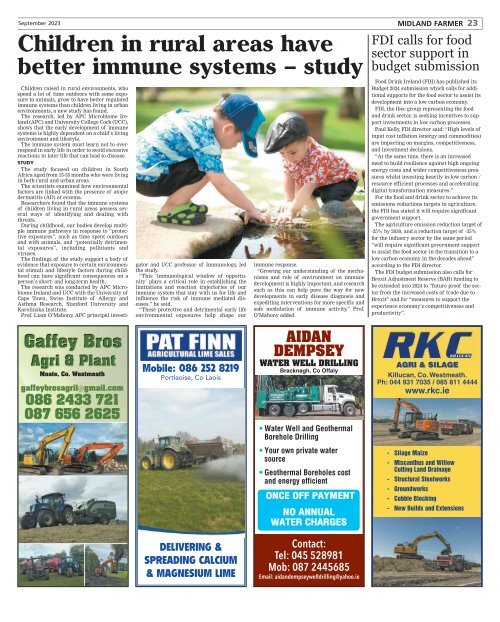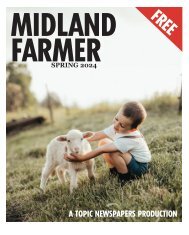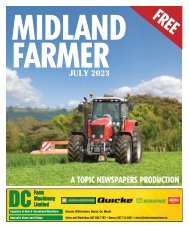Create successful ePaper yourself
Turn your PDF publications into a flip-book with our unique Google optimized e-Paper software.
<strong>September</strong> <strong>2023</strong><br />
Children in rural areas have<br />
better immune systems – study<br />
MIDLAND FARMER<br />
23<br />
FDI calls for food<br />
sector support in<br />
budget submission<br />
Children raised in rural environments, who<br />
spend a lot of time outdoors with some exposure<br />
to animals, grow to have better regulated<br />
immune systems than children living in urban<br />
environments, a new study has found.<br />
The research, led by APC Microbiome Ireland<br />
(APC) and University College Cork (UCC),<br />
shows that the early development of immune<br />
systems is highly dependent on a child’s living<br />
environment and lifestyle.<br />
The immune system must learn not to overrespond<br />
in early life in order to avoid excessive<br />
reactions in later life that can lead to disease.<br />
STUDY<br />
The study focused on children in South<br />
Africa aged from 15-35 months who were living<br />
in both rural and urban areas.<br />
The scientists examined how environmental<br />
factors are linked with the presence of atopic<br />
dermatitis (AD) or eczema.<br />
Researchers found that the immune systems<br />
of children living in rural areas possess several<br />
ways of identifying and dealing with<br />
threats.<br />
During childhood, our bodies develop multiple<br />
immune pathways in response to “protective<br />
exposures”, such as time spent outdoors<br />
and with animals, and “potentially detrimental<br />
exposures”, including pollutants and<br />
viruses.<br />
The findings of the study support a body of<br />
evidence that exposure to certain environmental<br />
stimuli and lifestyle factors during childhood<br />
can have significant consequences on a<br />
person’s short- and long-term health.<br />
The research was conducted by APC Microbiome<br />
Ireland and UCC with the University of<br />
Cape Town, Swiss Institute of Allergy and<br />
Asthma Research, Stanford University and<br />
Karolinska Institute.<br />
Prof. Liam O’Mahony, APC principal investigator<br />
and UCC professor of Immunology, led<br />
the study.<br />
“This ‘immunological window of opportunity’<br />
plays a critical role in establishing the<br />
limitations and reaction trajectories of our<br />
immune system that stay with us for life and<br />
influence the risk of immune mediated diseases,”<br />
he said.<br />
“These protective and detrimental early life<br />
environmental exposures help shape our<br />
immune response.<br />
“Growing our understanding of the mechanisms<br />
and role of environment on immune<br />
development is highly important, and research<br />
such as this can help pave the way for new<br />
developments in early disease diagnosis and<br />
expediting interventions for more specific and<br />
safe modulation of immune activity,” Prof.<br />
O’Mahony added.<br />
Food Drink Ireland (FDI) has published its<br />
Budget 2024 submission which calls for additional<br />
supports for the food sector to assist its<br />
development into a low carbon economy.<br />
FDI, the Ibec group representing the food<br />
and drink sector, is seeking incentives to support<br />
investments in low carbon processes.<br />
Paul Kelly, FDI director said: “High levels of<br />
input cost inflation (energy and commodities)<br />
are impacting on margins, competitiveness,<br />
and investment decisions.<br />
“At the same time, there is an increased<br />
need to build resilience against high ongoing<br />
energy costs and wider competitiveness pressures<br />
whilst investing heavily in low carbon /<br />
resource efficient processes and accelerating<br />
digital transformation measures.”<br />
For the food and drink sector to achieve its<br />
emissions reductions targets in agriculture,<br />
the FDI has stated it will require significant<br />
government support.<br />
The agriculture emission reduction target of<br />
-25% by 2030, and a reduction target of -35%<br />
for the industry sector by the same period<br />
“will require significant government support<br />
to assist the food sector in the transition to a<br />
low carbon economy in the decades ahead”<br />
according to the FDI director.<br />
The FDI budget submission also calls for<br />
Brexit Adjustment Reserve (BAR) funding to<br />
be extended into 2024 to “future proof the sector<br />
from the increased costs of trade due to<br />
Brexit” and for “measures to support the<br />
experience economy’s competitiveness and<br />
productivity”.<br />
Moate, Co. Westmeath<br />
Mobile: 086 252 8219<br />
Portlaoise, Co Laois<br />
gaffeybrosagril@gmail.com<br />
086 2433 721<br />
087 656 2625<br />
DELIVERING &<br />
SPREADING CALCIUM<br />
& MAGNESIUM LIME<br />
AIDAN<br />
DEMPSEY<br />
WATER WELL DRILLING<br />
Bracknagh, Co Offaly<br />
• Water Well and Geothermal<br />
Borehole Drilling<br />
• Your own private water<br />
source<br />
• Geothermal Boreholes cost<br />
and energy efficient<br />
ONCE OFF PAYMENT<br />
NO ANNUAL<br />
WATER CHARGES<br />
Contact:<br />
Tel: 045 528981<br />
Mob: 087 2445685<br />
Email: aidandempseywelldrilling@yahoo.ie<br />
AGRI & SILAGE<br />
Killucan, Co. Westmeath.<br />
Ph: 044 931 7035 / 085 811 4444<br />
www.rkc.ie<br />
- Silage Maize<br />
- Miscanthus and Willow<br />
Cutting Land Drainage<br />
- Structural Steelworks<br />
- Groundworks<br />
- Cobble Blocking<br />
- New Builds and Extensions
















